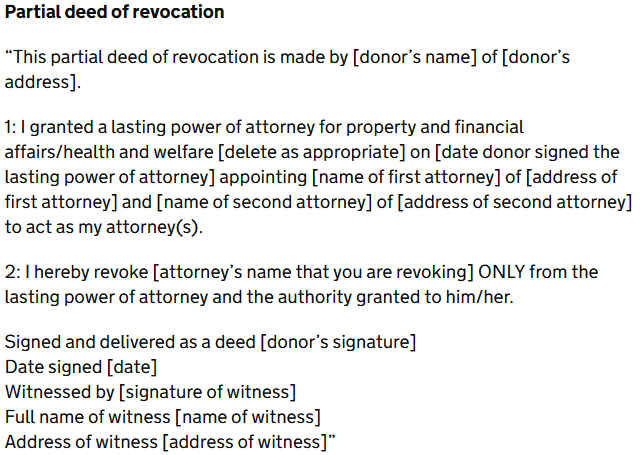Lasting Power of Attorney: Can I stop being an attorney?
A friend of mine is an attorney for her neighbour, but is now struggling to act as an attorney through her own ill health – she has asked me if she can “stop” being an attorney, a question that I’ll explore in this blog. I’ll start by explaining what a Lasting Power of Attorney is, then how and when and attorney could act and finally describe how an attorney can stop or relinquish their role.
In the following two blogs I’ll stay with the theme of stopping being an attorney looking next at how a donor may remove an attorney and finally when an attorney’s role may cease due to factors outside the control of either the donor or attorney.
What is a Lasting Power of Attorney?
A Lasting Power of Attorney (LPA) is a legal document that lets a person appoint one or more people to make decisions on their behalf. This gives more control over what happens if a person has a sudden accident, illness or a long-term health condition and cannot make their own decisions.[i] The people appointed to make decisions are called attorneys and the person making a Lasting Power of Attorney is called the donor.
When creating a Lasting Power of Attorney, a donor can choose whether or not to appoint replacement attorneys, these are attorneys who can step in if a primary attorney is unable to act. When working with clients I always recommend they have at least two primary attorneys or, if they choose just to have one, then they also have a replacement attorney. This is because the Lasting Power of Attorney would cease if there was a single attorney and they became unable to act. It is not possible to add an attorney to an existing Lasting Power of Attorney.
There are two different types of Lasting Power of Attorney, one for Health and Welfare and one for Property and Finance; I have blogged about how to make a Lasting Power of Attorney previously and you can find out more here.
Acting as an Attorney
An attorney for Health and Welfare will only step in if the donor loses capacity to make healthcare decisions; it’s really important to remember that capacity isn’t a simple binary concept, (you either have it or you don’t), but rather it is far more nuanced concept. Somebody should always be supported to make decisions and, whilst they may be unable to make more complex decisions, there may be decisions that they retain the capacity to make. It is beyond the scope of this blog to go into more detail about the Mental Capacity Act, (one to add to the list!), however you can find out more in the Mental Capacity Act Code of Practice.
The Property and Finance Lasting Power of Attorney differs from a Health and Welfare Lasting Power of Attorney insomuch as the donor can decide, when creating the document, how the Lasting Power of Attorney can take effect. With the donor’s consent, a Property and Finance Lasting Power of Attorney can take effect as soon as it’s registered with the Office of the Public Guardian (meaning attorneys could act for the donor whilst the donor retains capacity) or on loss of capacity. The Office of the Public Guardian provide examples of when this might be useful which you can see below:
How to stop being an attorney
Having set out what a Lasting Power of Attorney is and when an attorney can act I’ll return to the question that started this blog – can my friend stop being an attorney? The short answer is yes, it is possible for a donor to relinquish their role, this can also be referred to as “disclaiming an attorneyship”.
If a donor decides to disclaim their attorneyship they will need to complete and send the form LPA005. The form must be sent to:
· The donor if the Lasting Power of Attorney has not been registered
· The donor and the Office of the Public Guardian[i] if the Lasting Power of Attorney has been registered
· Any other attorneys appointed through the Lasting Power of Attorney
Conclusion
An attorney may find themselves in a position where they are unable to begin or continue their role and I have described the formal route to disclaim the attorneyship. To mitigate against the risk of an attorney disclaiming their role it is valuable to appoint more than one primary attorney or add a replacement attorney when drafting the Lasting Power of Attorney.
In the next blog I’ll explain how a donor may remove an attorney.
If the blog has helped you or provided information and you would like to support my ongoing work, head to Buy me a coffee – thank you!
[1] To understand more about decision making and capacity listen to Mental Capacity: it’s decision specific not a binary concept with Dr Maggie Keeble
[ii] Address for the Office of the Public Guardian: PO Box 16185, Birmingham, B2 2WH. United Kingdom


